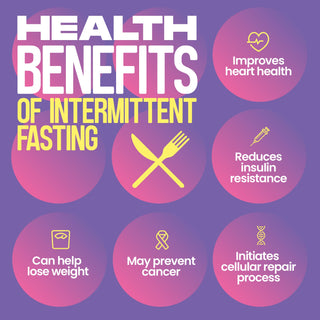
5 Reasons to get Started with Intermittent Fasting
Ancient healing strategies, from a number of different cultures, consider fasting to be the way for your body to heal and repair itself during times of sickness. Other cultures believed that greater mental clarity and spiritual awakening was obtained by restricting food intake. Today, the concept of fasting has been taken and given a modern spin, known as intermittent fasting. Intermittent fasting is creating a lot of buzz among health professionals these days. Some claim it to be “the breakthrough” to fat loss while others believe it’s just another fad diet. But what does the evidence say? And who can really benefit from it?
How to Fast
Intermittent fasting relies on the notion that the timing of food intake is crucial to how your body will use it. It claims that restricting your eating window to 6-8 hours, thereby extending your fasting window to 16-18 hours, will yield tremendous benefits for fat loss, hormone balance, energy, and insulin stabilisation. From an evolutionary standpoint, researchers say that our ancestors went through periods where food was abundant at certain times and less available at others. This feast and famine pattern conditioned the human body to burn stored fat as its primary source of energy when food was scarce. As well, many ancient religions observed fasting as a way of cleansing and creating mental alertness.
There are several ways to go about intermittent fasting depending on your lifestyle and personal preferences. The most commonly used method is the 16:8 - which consists of 16 hours of fasting and an 8 hour window for eating. Although sixteen hours of fasting may seem like a bit much, keep in mind that sleep will take up between 7-9 hours of your fats. An example of this would be breaking your fast at 11:00 am and eating your last meal at 7:00 pm.
Another Intermittent Fasting approach is the Warrior Diet, consisting of a 20 hour fast and 4 hour eating cycle. Ori Hofmekler, the author of The Warrior Diet, suggests:“there is a dual relationship between your feeding and innate clock. And as much as your innate clock affects your feeding, your feeding can affect your innate clock. Routinely eating at the wrong time will disrupt your innate clock and devastate vital body functions; and you'll certainly feel the side effects as your whole metabolic system gets unsynchronized.” This method is not for everyone and would need to be developed gradually, as twenty hours of fasting may be quite difficult for some. An example of this would be breaking your fast at 2:00 pm and having your last meal at 6:00 pm, allowing for twenty hours of fasting in between.
Block fasting has also gained some popularity; it consists of a full 4-10 day fast done periodically instead of fasting intermittently on a daily basis. As block fasts can last for several days, one would rely solely on water, bone broth, or whey while the body completely cleanses and detoxifies itself. Block fasts, if done at least once a year, have been shown to reduce risk for developing cancer, breakthrough weight loss plateaus, balance hormones, help reach a state of ketosis quicker, improve insulin sensitivity and even increase cellular energy. Even a 24 hour fast is enough to boost the human growth hormone by 1300-2000%! For a block fast to be done safely, a state of ketosis must be obtained first.
Finally, there is the alternate day method, where most of the research on intermittent fasting originated. This system consists of fasting for 2 days out of the week and eating normally for the remaining 5 days. It is important to note that liquids such as water, tea, and coffee may be consumed during the fasting hours to prevent dehydration. Coffee also acts as an appetite suppressant which may help you to get to that first late meal of the day. Each of these methods are effective in their own ways, and useful when done in accordance with one’s schedule and lifestyle.
It is important to note that intermittent fasting is not a calorie-restriction diet, nor does it count macronutrients or portion sizes, but rather, it limits the window in which we consume food during the day. You are not eating less food, but rather eating less often. Changing your eating patterns may be challenging at first. One patient told me that he was so hungry on the first day, even the old can of SPAM sitting in his pantry started to look appetising. Hang in there though, it only takes the body a short time to adapt and the benefits are well worth it.


The Phases of Fasting
When you first begin to limit your eating window, your body will have to shift from food burning mode to fat burning mode, meaning that the constant flow of food for energy is stopped, therefore the body must now rely on its own fat stores for energy. When this occurs, a state of ketosis occurs; meaning that the body will burn fat for its primary source of energy rather than sugar. This process may take a while, and hunger is bound to happen, however once the body has adapted to this new shift, you will be able to rely on your own body fat for energy without extreme senses of hunger.
The Benefits of Fasting
- Increased ability to become fat adaptive, resulting in greater fat loss: as your body fluctuates between periods of fasting and eating, it will start burning fat as fuel, as opposed to carbohydrates.
- Stabilise insulin and leptin resistance.
- Increase in ghrelin: feeling less hungry.
- Decrease in triglycerides, inflammation and free radicals.
- Help metabolic syndrome (high blood pressure, cardiovascular disease, high LDL cholesterol, oxidative stress).
- Boosts the human growth hormone (HGH), usually produced during sleep and exercise (potentially by up to 2000%!)
- Fasted exercise can boost testosterone (the muscle building hormone) levels by up to 180%! In addition, eating prior to exercise caused a significant drop in testosterone levels in comparison to being fasted
- In one study, fasting dropped levels of leptin by 76.3% in obese males - this means massive weight loss!
- Another study showed that only 20 hours of water fasting was enough to increase insulin sensitivity
- Intermittent fasting is more effective for muscle retention with weight loss than strictly caloric restriction
- Fasting less than 13 hours per night was associated with an increase in the risk of breast cancer recurrence versus 13 or more hours per night. In addition, each 2-hour increase in the nightly fasting duration was associated with significantly lower haemoglobin A1c levels and a longer duration of night-time sleep, according to one study.
- Intermittent fasting showed improvements in performance on behavioural tests of sensory and motor function, learning, memory, and was even associated with increased synaptic plasticity.


Still not convinced? Here are five huge reasons why intermittent fasting can aid in increasing life span:
- In a study of epigenetics, Intermittent fasting has shown to turn on longevity genes and turn off inflammatory genes.
- Intermittent fasting inhibits glucose and insulin spikes, which are known now to be the underlying causes of inflammation and disease.
- Autophagy (the processes by which your body cleans out various debris, including toxins, and recycles damaged cell components) occurs within only 18 hours of fasting. This means that cancer cells cannot adapt and will eventually self-destruct.
- As fasting accelerates the process of entering ketosis, the body burns clean energy, preventing inflammation from occurring in the body, which heals the brain and changes the DNA for the better.
- Intermittent fasting has also been shown to increase production of new neurons from neural stem cells.
Thinking about Fasting?
If you are eager to test out the benefits of intermittent fasting yourself, here is how to get started:
First, choose your eating and fasting window. For beginners, you can start the first week with eating for 12 and fasting for 12 and slowly decrease your eating window by 2 hours each week until you reach your desired schedule.
Optimally, try to attain a fasting window of 16-18 hours and an eating window of 6-8 hours as this will yield the best results. Or, you may choose to do a 24 hour fast once or twice a week and resume eating normally the rest of the week (just maybe warn your loved ones on the days you fast!) For example, let’s say you chose to use the 16:8 method - in this scenario, you would have your first meal around 11 am to 12 pm (typically when you would have lunch) and have your last meal around 7pm-8pm. You can choose to have 2-3 meals throughout your eating window, but beware of snacking too much!
You are also going to have to decide whether you are going to opt for a dirty, clean or fat fast. A dirty fast is when you consume up to 100 calories within your fasting period. Your calories should be made up of good fats, so a fatty coffee is a great option to keep it clean and stave off the crave. A clean fast is when you don't consume any calories during your fasting window and a fat fast is when you break your fast with good fats.
At WillPowders we think that dirty and fat fasting are the way forward to ensure that your hormones stay balanced and you don't end up diving head first into the biscuit tin.


MCT it Up!
Ensure your meals consist of a good balance of healthy fats and proteins, and reduce starchy carbohydrates for optimal levels of satiety. When your eating window is complete, fluids such as tea and water are still okay to consume and even necessary to keep you hydrated. If you are having trouble, skip ‘breakfast,’ and opt for a coffee and a healthy source of fat such as MCT Powder. This is the perfect appetite suppressant and may even help your body produce more ketones while lowering blood glucose.
Diet Variation: Why is it so Important?
Although the benefits of intermittent fasting as described are extensive, variation within the timing of meals throughout the week are crucial for reaching optimal results. The body is a pattern-recognizing machine - which evolutionarily was essential for survival - and therefore adapts to the stimuli it is faced with. To keep the benefits of fasting and ketones up to par, the body needs to be ‘shocked’ periodically by manipulating meal timing and macronutrient intake. With this in mind, we have what is called the 5-1-1 rule, which comprises 5 days of intermittent fasting, 1 day of feast and 1 day of famine. For example, from Monday to Friday you would stick to a 16:8 schedule, on Saturday you would do a feast - meaning that you increase protein and carbohydrate intake significantly compared to your intermittent fasting days - followed by a day of famine where you would do a full 24-hour fast with water. This diet variation cycle is designed to push you into ketosis if you are having difficulty adapting to burning fat, not losing weight, experience low in energy, have hormone imbalances, have trouble with insulin/leptin resistance, or are not seeing any improvements with your normal intermittent fast.
Another key aspect of diet variation is that it is not meant to be maintained all year-round. Moreover, your diet should be varying throughout the seasons depending on your body’s needs. Historically, ancient cultures were forced into dietary shifts from environmental factors, seasonal changes, or simply the lack of food. Indigenous cultures survived harsh, cold North American winters simply by being in a state of ketosis - where relying on scarce animal meats and fats was their only choice. However, in the summer, meat was barely consumed and greens and carbs were higher. We can mimic these dietary shifts ourselves weekly, monthly, and even seasonally. Ideally, a rotation between very low carb and higher healthy carb diets seasonally (every 3-4 months) should yield the best results.


Factors to Consider before Fasting:
- Which strategy works best for you? Which is most convenient for your daily schedule? It’s important to note that you can create your own intermittent fasting schedule; you may try starting with a twelve hour eating window and twelve hour fasting window and work your way down to a smaller eating window as your body slowly adapts to the change.
- You MUST already have healthy eating habits. Intermittent fasting will not produce benefits if the food being consumed is processed and high in refined sugars and carbohydrates. You MUST be consuming a diet of whole foods, rich in fruits, vegetables, nuts, seeds, organic meats, and healthy fats. Intermittent fasting on a “junk food diet” is NOT the way to do it!
- Gender. Due to hormonal activity, men are able to continue an intermittent fasting schedule longer than women. If you are female, consider trying it for a maximum of three months, then go back to regular eating for a while before restarting.
- Sleep is crucial. - If you don’t sleep well, intermittent fasting may not be the best option for you as you likely have disruptions in your circadian cycle, which is important to intermittent fasting. You can gather some sleep hacks from our ‘Why Can’t I Sleep? Blog.
- Hypoglycemia or sugar imbalances. If you are hypoglycemic or have an imbalance in your blood sugar levels, gradually introduce fasting to your diet, as it can cause drops in blood sugar and induce feelings of lethargy. I recommend that you are monitored by a knowledgeable healthcare practitioner while fasting.
Is Intermittent Fasting Right for me?
Intermittent fasting is not a one-size-fits-all approach and may not be for everyone, though many people trying to lose larger amounts of weight or trying to stabilise insulin levels may find it beneficial. People with inflammatory conditions such as arthritis, atherosclerosis, irritable bowel syndrome, asthma and autoimmune disorders may also experience great relief by adopting an intermittent fasting approach. It is also important to note that it may require practice, but for those who choose to follow it, it can yield great results. Remember, you are not eating less food, you are simply eating less often.
Whenever you make changes to your diet, be sure to check in with yourself after a few weeks. How are you feeling? How are your energy levels? Are you tired or do you feel energised? Are you able to stabilise your blood sugar better? Are you sleeping better? Do you feel less sore? Food is fuel! It’s important to figure out what works for you, and your health.
For more tips on how to regulate weight and how to fast in a healthy way, check out our ‘Why can’t I Stop Eating? Blog. You might also find our ‘How to Willpowder’ guides really useful to support you in getting started.
Disclaimer
Our blogs are written with love in the hope that they go some way in helping you feel like the rockstar you are, and whilst we do our due diligence, research like maniacs and fact check our stuff, we know everyone’s journey is different. They are intended to educate and empower you, not usurp medical advice. We would never advise you to stop, adjust, or modify any prescription medication without the direct supervision of your healthcare practitioner, but don’t be afraid to talk to your doctor about your new found knowledge, brought to you by the marvels of nature because they don't know everything! Blogs are always informed by Davinia but often written by a member of the team. Not all blogs reflect Davinia's experiences and sometimes provide alternative perspectives

 Collagen
Collagen
 Protein
Protein
 MCT
MCT
 Electrolytes
Electrolytes
 Vitamins & Minerals
Vitamins & Minerals
 Hormones
Hormones
 Nootropics
Nootropics
 Kombucha
Kombucha
 Biohacking Books
Biohacking Books
 Bundles
Bundles
 Accessories
Accessories














